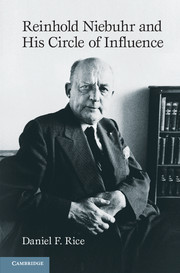Book contents
- Frontmatter
- Contents
- Acknowledgments
- Introduction
- Chapter 1 Paul Tillich (1886–1965)
- Chapter 2 John Dewey (1859–1952)
- Chapter 3 Norman Thomas (1884–1968)
- Chapter 4 Arthur Schlesinger Jr. (1917–2007)
- Chapter 5 Hans Morgenthau (1904–1980)
- Chapter 6 George Kennan (1904–2005)
- Chapter 7 Felix Frankfurter (1882–1965)
- Afterword
- Index
- References
Chapter 7 - Felix Frankfurter (1882–1965)
Published online by Cambridge University Press: 05 November 2012
- Frontmatter
- Contents
- Acknowledgments
- Introduction
- Chapter 1 Paul Tillich (1886–1965)
- Chapter 2 John Dewey (1859–1952)
- Chapter 3 Norman Thomas (1884–1968)
- Chapter 4 Arthur Schlesinger Jr. (1917–2007)
- Chapter 5 Hans Morgenthau (1904–1980)
- Chapter 6 George Kennan (1904–2005)
- Chapter 7 Felix Frankfurter (1882–1965)
- Afterword
- Index
- References
Summary
Felix Frankfurter was appointed to the Supreme Court by Franklin D. Roosevelt in 1939, replacing the recently deceased Benjamin N. Cardozo. He served on the Court until his retirement in 1962. Reinhold Niebuhr claimed that Felix Frankfurter was “the most vital and creative person I have ever known.” In his 1965 memorial to his long-time friend, Niebuhr remarked that in addition to being “a great teacher of the Law, a confidant of Presidents and a justice of the Supreme Court,” Frankfurter was also “a superb conversationalist with a wide range of interests far beyond his legal expertise and an intense intellectual vitality that was the pride and despair of his friends.” Niebuhr knew this firsthand since Frankfurter and he shared many hours conversing during the summer months in Heath, Massachusetts.
Professionally, Niebuhr’s and Frankfurter’s worlds were divergent and often remote. In spite of their common interests in the political life of the nation, the distance between the world of jurisprudence and that of theological and social polemics was far greater than the simple geographical distance between Washington, DC, and New York City which separated them. Reinhold Niebuhr had many admirers among the ranks of those whom Frederick Schleiermacher called the “cultured despisers of religion,” those who appreciated and relied upon Niebuhr’s social vision yet were utterly bewildered if not embarrassed by his theological orientation. Frankfurter in an important sense seems to have belonged to this group. He was raised in an “observant” but not “orthodox” Jewish household, and, in spite of the “warmth of the familiar” which such elements of the communal life provided, Frankfurter disassociated himself from “religious” Judaism when he was still a young man. With some reservation, he referred to himself as a “reverent agnostic” or a “believing unbeliever.” Yet this “reverent agnostic” would go out of his physical and intellectual way to hear Niebuhr preach.
- Type
- Chapter
- Information
- Reinhold Niebuhr and His Circle of Influence , pp. 205 - 246Publisher: Cambridge University PressPrint publication year: 2012



